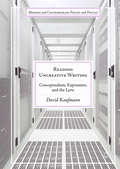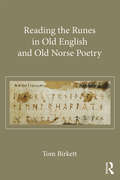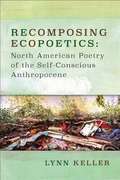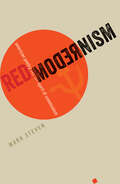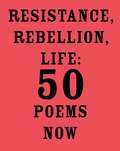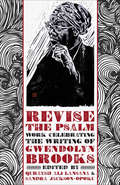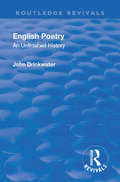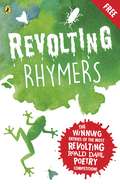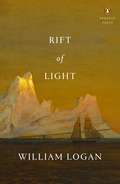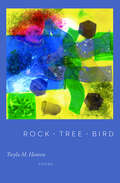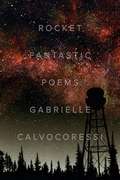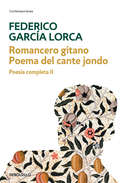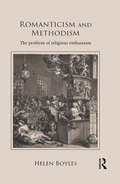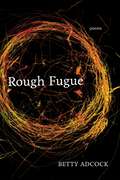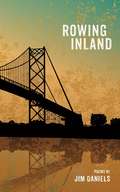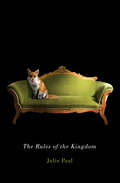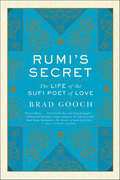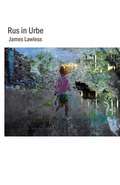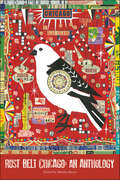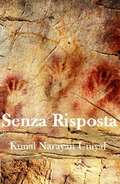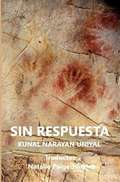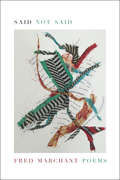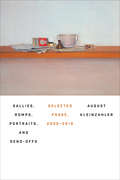- Table View
- List View
Reading Uncreative Writing
by David KaufmannThis book examines Uncreative Writing--the catch-all term to describe Neo-Conceptualism, Flarf and related avant-garde movements in contemporary North American poetry--against a decade of controversy. David Kaufman analyzes texts by Kenneth Goldsmith, Vanessa Place, Robert Fitterman, Ara Shirinyan, Craig Dworkin, Dan Farrell and Katie Degentesh to demonstrate that Uncreative Writing is not a revolutionary break from lyric tradition as its proponents claim. Nor is it a racist, reactionary capitulation to neo-liberalism as its detractors argue. Rather, this monograph shows that Uncreative Writing's real innovations and weaknesses become clearest when read in the context of the very lyric that it claims to have left behind.
Reading the Runes in Old English and Old Norse Poetry
by Thomas BirkettReading the Runes in Old English and Old Norse Poetry is the first book-length study to compare responses to runic heritage in the literature of Anglo-Saxon England and medieval Iceland. The Anglo-Saxon runic script had already become the preserve of antiquarians at the time the majority of Old English poetry was written down, and the Icelanders recording the mythology associated with the script were at some remove from the centres of runic practice in medieval Scandinavia. Both literary cultures thus inherited knowledge of the runic system and the traditions associated with it, but viewed this literate past from the vantage point of a developed manuscript culture. <P><P> There has, as yet, been no comprehensive study of poetic responses to this scriptural heritage, which include episodes in such canonical texts as Beowulf, the Old English riddles and the poems of the Poetic Edda. By analysing the inflection of the script through shared literary traditions, this study enhances our understanding of the burgeoning of literary self-awareness in early medieval vernacular poetry and the construction of cultural memory, and furthers our understanding of the relationship between Anglo-Saxon and Norse textual cultures. The introduction sets out in detail the rationale for examining runes in poetry as a literary motif and surveys the relevant critical debates. The body of the volume is comprised of five linked case studies of runes in poetry, viewing these representations through the paradigm of scriptural reconstruction and the validation of contemporary literary, historical and religious sensibilities.
Recomposing Ecopoetics: North American Poetry Of The Self-Conscious Anthropocene (Under The Sign Of Nature Series)
by Lynn KellerTwo communities have been crucial to the development of this book. The first is the Center for Culture, History, and Environment (CHE) in the Nelson Institute for Environmental Studies at the University of Wisconsin-Madison.
Red Modernism: American Poetry and the Spirit of Communism (Hopkins Studies in Modernism)
by Mark StevenHow did modernist poetry respond—both thematically and technically—to communism?In Red Modernism, Mark Steven asserts that modernism was highly attuned—and aesthetically responsive—to the overall spirit of communism. He considers the maturation of American poetry as a longitudinal arc, one that roughly followed the rise of the USSR through the Russian Revolution and its subsequent descent into Stalinism, opening up a hitherto underexplored domain in the political history of avant-garde literature. In doing so, Steven amplifies the resonance among the universal idea of communism, the revolutionary socialist state, and the American modernist poem.Focusing on three of the most significant figures in modernist poetry—Ezra Pound, William Carlos Williams, and Louis Zukofsky—Steven provides a theoretical and historical introduction to modernism’s unique sense of communism while revealing how communist ideals and references were deeply embedded in modernist poetry. Moving between these poets and the work of T. S. Eliot, Langston Hughes, Muriel Rukeyser, Gertrude Stein, Wallace Stevens, and many others, the book combines a detailed analysis of technical devices and poetic values with a rich political and economic context. Persuasively charting a history of the avant-garde modernist poem in relation to communism, beginning in the 1910s and reaching into the 1940s, Red Modernism is an audacious examination of the twinned history of politics and poetry.
Resistance, Rebellion, Life: 50 Poems Now
by Amit MajmudarPoets on the march: 50 crucial poems written in response to the current political climate, selected and introduced by the Ohio Poet Laureate—and son of immigrants—Amit Majmudar. In a political atmosphere where language and even meaning itself are continually under threat, poetry has a critical role to play. And our poets have been responding—in the streets and at their desks, demanding a full accounting from themselves and from their nation. Majmudar's elegant introduction to these vital poems reminds us that "false stories take a lot of killing because they are made of language. Because they are made of language, though, they can be killed." From Solmaz Sharif and Eileen Myles to Kevin Young and Juan Felipe Herrera, American poets of diverse styles and strategies have contributed their truths: scenes from the front lines of resistance, and from the interior of our collective conscience. A final cento by Majmudar—a poem including at least one line or phrase from each of the poems in the volume—celebrates the robust multiplicity of voices in this book and in America now.
Revise the Psalm: Work Celebrating the Writing of Gwendolyn Brooks
by Sandra Jackson-Opoku Quraysh Ali Lansana"In the hands of Gwendolyn Brooks, old age is a diamond with many facets. Throughout her poetry Brooks has illuminated old age as a time of isolation and withdrawal, remembrance and continuity, poverty, vulnerability, even homelessness, exploitation, neglect, abandonment, marginalization and destruction. And, yet, she offered resistance and affirmation."-Angela Jackson, award-winning poet and activistThe year 2017 marks the 100th birthday of the late poet and cultural icon Gwendolyn Brooks. Miss Brooks' depictions of poor and working class African Americans provides insight into the civil rights movement of the 1960s, and her lens on the Great Migration, hard and necessary truths about race injustice, and the Black Power movement interprets and contextualizes current racial inequities and tensions. This collection of poetry, essays, and art inspired by the work of Miss Brooks celebrates her life, writing, and activism.Quraysh Ali Lansana is author or editor of twenty books. He is a faculty member of the Writing Program of the School of the Art Institute of Chicago. Lansana served as Director of the Gwendolyn Brooks Center for Black Literature and Creative Writing at Chicago State University from 2002 to 2011.Sandra Jackson-Opoku has authored two novels. The River Where Blood is Born earned the American Library Association Black Caucus Award for Best Fiction. Hot Johnny (and the Women Whom Loved Him) was an Essence magazine bestseller. Her fiction, poetry, articles, essays, and scripts have appeared the Los Angeles Times, Ms. magazine, the Literary Traveler, Islands Magazine, and elsewhere.
Revival: An unfinished history (Routledge Revivals)
by John DrinkwaterWhen a Poet writes poetry he can scarcely fail to interest. And the author of this posthumous volume was not only a poet but no mean critic too. As a result, his approach to English Poetry is not a work of merely casual interest: it is illuminating. No one could fail to be enriched and delighted by its discriminating enthusiasms, its happy quotations, and the no less happy judgements, discoveries, definitions and phrases which it gives us. The historical portion is contained in the latter half, which deals with its subject in a discursive way from the beginnings to Elizabethan times - where the author stopped in the middle of a sentence. This premature ending is deepy regretted. But, fortunately for us, the first five chapters are devoted to general and personal observations, and are so full of references to the intervening and modern periods that we can genuinely claim to have here a fair impression of Drinkwater's view of the whole panorama of English Poetry.
Revival: The Psychology Of The Poet Shelley (1925) (Routledge Revivals #No. 33)
by Edward Carpenter George BarnefieldLate studies in the Psychology of Sex have led to some interesting speculations with regard to the poet Shelley; and it is with pleasure that I write a few lines by way of introduction to the following paper by my friend, George Barnefield, which puts very clearly, as I think, some points in Shelley's temperament which have hitherto been neglected or misunderstood, and which call for renowned consideration. Not having myself made a special study of the Modern Psychology, I do not pretend to certify to the absolute truth of the theories put forward by Mr. Barnefield, but I do certainly think, after due consideration, that they are worthy of very careful study.
Revolting Rhymers: Competition Winners
by Quentin BlakeThe Winning Entries of the most REVOLTING Poetry Competition!To celebrate the BBC's new two-part animation of Roald Dahl's Revolting Rhymes, the Roald Dahl Literary Estate launched a poetry competition with a twist, asking chiddlers far and wide to submit their most revolting - and humorous rhymes. We were inundated with thousands of disgusterous entries! To discover our winners, we waded through burps, farts and rotten eggs; bogies, vile stew and goo to find the funniest and most revolting specimens. This eBook contains the crème de la phlegm-hand picked by children's author, songwriter and McFly frontman, Tom Fletcher, and Wales's Children's Poet Laureate, Anni Llyn. A huge thank you to our revolting partners Puffin Books, the National Literacy Trust, Literature Wales, Magic Light, and the Roald Dahl Museum and Story Centre for all their help and support!
Rift of Light
by William LoganNew work from a poet who "seems to be getting stronger with each collection" (David Yezzi, The New Criterion)William Logan is widely admired as one of our foremost masters of free verse as well as formal poetry; his classical verve conjures up the past within the present and the foreshadowings of the present within the past. In their sculptural turns, their pleasure in the glimmerings of the sublime while rummaging around in the particular, the poems in Rift of Light, Logan's eleventh collection, are a master class of powerful feeling embedded in language. Ranging from Martin Luther to an abandoned crow, from a midwife toad to a small-town janitor, from actress Louise Brooks to Dürer's stag beetle, Logan shows an encyclopedic attention to the passing world. Dry, witty, skeptical, these dark and acidic poems prove a constant and informing delight.
Rock Tree Bird
by Twyla M. Hansen2018 Nebraska Book Award This collection of poems by the State Poet of Nebraska covers significant emotional territory while remaining firmly grounded in the landscape. From memories of the isolation and beauty of growing up on a farm, to a burgeoning awareness as a teenager of the economic and cultural forces waged against family farming, to coming to terms with the legacies of her parents after their passing, and, finally, arriving at an appreciation of nature and the environment wherever and whenever she finds it, Twyla M. Hansen offers poems that are alternately sad, sweet, funny, moving, human, and humane.
Rocket Fantastic: Poems
by Gabrielle CalvocoressiFrom the author of The Last Time I Saw Amelia Earhart, a spellbinding reinvention of self, family, and gender. <P><P>Like nothing before it, Rocket Fantastic reinvents the landscape and language of the body in interconnected poems that entwine a fabular past with an iridescent future by blurring, with disarming vulnerability, the real and the imaginary. Sorcerous, jazz-tinged, erotic, and wide-eyed, this is a pioneering work by a space-age balladeer.
Romancero gitano | Poema del cante jondo (Poesía completa #2)
by Federico García LorcaRomancero gitano | Poema del cante jondo es el segundo volumen de la Biblioteca Federico García Lorca que reúne su obra completa, y el segundo que compila su «Poesía completa». En este libro, se ofrecen al lector clásicos lorquianos como el Romancero gitano o el Poema del cante jondo, junto con las dos conferencias pronunciadas por el poeta en la presentación de los mismos, además de las Odas y su primera colección de Poemas sueltos. La edición y los prólogos, a cargo de Miguel García Posada, permiten al lector acercarse a la complejidad de su obra y disfrutar, a lo largo de los siete volúmenes que componen esta Biblioteca Federico García Lorca, de uno de los autores españoles más relevantes del siglo XX. Pablo Neruda dijo...«Desde ese tiempo en que los españoles del pueblo besaban el hábito de Lope de Vega no se ha conocido en lengua española una seducción tan inmensa dirigida a un poeta.» --------------------------------------------------------------------------BIBLIOTECA FEDERICO GARCÍA LORCA Poesía competa:1. Libro de poemas | Primeras canciones | Canciones2. Romancero gitano | Poema del cante jondo3. Poeta en Nueva York | Sonetos Teatro completo:4. La zapatera prodigiosa | Mariana Pineda5. El público | Así que pasen cinco años6. Bodas de sangre | Yerma7. La casa de Bernarda Alba | Doña Rosita la soltera--------------------------------------------------------------------------
Romanticism and Methodism: The problem of religious enthusiasm
by Helen BoylesExploring the intense relationship between Romantic literature and Methodism, Helen Boyles argues that writers from both movements display an ambivalent attitude towards the expression of deep emotional and spiritual experience. Boyles takes up the disparaging characterization of William Wordsworth and other Romantic poets as 'Methodistical,' showing how this criticism was rooted in a suspicion of the 'enthusiasm' with which the Methodist movement was negatively identified. Historically, enthusiasm has generated hostility and embarrassment, a legacy that Boyles suggests provoked concerted efforts by Romantic poets such as Wordsworth and the Methodist leaders John and Charles Wesley to cleanse it of its derogatory associations. While they distanced themselves from enthusiasm's dangerous and hysterical manifestations, writers and religious leaders also identified with the precepts and inspiration of a language and religion of the heart. Boyles's analysis encompasses a range of literary genres from the Methodist sermon and hymn, to literary biography, critical review, lyric and epic poem. Balancing analysis of creative content with a consideration of its critical reception, she offers readers a detailed analysis of Wordsworth's relationship to popular evangelism within a analytical framework that incorporates Samuel Taylor Coleridge, Robert Southey, and William Hazlitt.
Rough Fugue: Poems (Southern Messenger Poets)
by Betty AdcockBetty Adcock brings fierce insight to her seventh poetry collection, Rough Fugue. Her elegant stanzas evoke bygone moments of beauty, reflection, and rage. “Let things be spare,” she writes, “and words for things be thin / as the slice of moon / the loon’s cry snips.” Adcock’s poems are often spare but never thin, shifting effortlessly from the eerie red of brake lights on a Texas highway to the fluorescents of an office building where a tired worker imagines a holiday in Spain.Adcock reflects upon her poetic forebears, chronicling the desire to write that led them to create cuneiform tablets, scrolls of papyrus, and ultimately vellum and parchment. She also recounts memories about the life with her late husband and tries to define herself in the bewildering new role of “widow.” In poems ranging in tone from playful to reverential, Rough Fugue showcases the work of a veteran poet at her masterful best.
Rowing Inland (Made in Michigan Writers Series)
by Jim DanielsRowing Inland, Jim Daniels’s fifteenth book of poetry is a time machine that takes the reader back to the Metro Detroit of his youth and then accelerates toward the future. With humor and empathy, the author looks at his own family’s challenges and those of the surrounding community where the legacy handed down from generation to generation is one of survival. The economic hits that this community has to endure create both an uncertainty about its future and a determined tenacity. Divided into four sections, Rowing Inland calls out key moments from the author’s life. The events that inspire many of these poems took place a long time ago and often it has taken the poet his entire life to write about those experiences and write about them with the necessary emotional distance. For example, some of the poems in the section “Late Invocation for Magic” reference the first girl he ever kissed and her accidental death by fire. In the last section of the book, Daniels approaches the current political and social standings in Detroit with lines like, “The distance to Baghdad or Kandahar / is measured in rowboat coffins / while here in the fatty palm of The Mitten / minor skirmishes electrify tedium.” Although it focuses on Detroit’s metropolitan area, the book can be considered a snapshot of working-class life anywhere across the country. Daniels casts his lens on a way of life that is often distorted or ignored by the powers that be. He zooms in on street level where all the houses may look alike but each holds its own secrets and dreams. To paraphrase novelist and screenwriter Richard Price, Detroit is the “zip code for [Daniels’s] heart”—a place that his writing will always come back to. Readers of contemporary poetry with a regional persuasion will enjoy this collection.
Rules of the Kingdom
by Julie PaulA lapsed religion still emits / faint signals; God, / in his satellite dish, / groans / moving on. To seek belonging, to strain against the familiar – these are the polarities many of us live between, feeling the pull of each desire. Offering a particular history, an intimate vantage point from within the various kingdoms we inhabit, Julie Paul’s The Rules of the Kingdom is an exploration of this struggle on a personal level and a universal one. Broken into five sections, the book examines the human struggle to find meaning, comfort, and a sense of home. In “Settlers’ Descendant Reclaims the Past,” the poems consider rural life, both the specific and the collective, including a village’s destruction by fire. In “Weight of the Word” the focus turns to family of origin, religion, and rites of passage. Poems take a familial tack again in “Cleavage,” wherein Paul dives into the waters of motherhood, and they drift into further intimacy in “The World’s Smallest Republic,” a series of poems about sex, love, and marriage. Finally, the poems in the fifth section, “Next Time the World Will Burn,” explore our place in the twenty-first century and offer some idiosyncratic suggestions on how to live. At turns humorous, playful, contemplative, and coy, the poems in The Rules of the Kingdom question the vagaries of faith and family but ultimately celebrate life and love.
Rules of the Kingdom (Hugh MacLennan Poetry Series #39)
by Julie PaulA lapsed religion still emits / faint signals; God, / in his satellite dish, / groans / moving on. To seek belonging, to strain against the familiar – these are the polarities many of us live between, feeling the pull of each desire. Offering a particular history, an intimate vantage point from within the various kingdoms we inhabit, Julie Paul’s The Rules of the Kingdom is an exploration of this struggle on a personal level and a universal one. Broken into five sections, the book examines the human struggle to find meaning, comfort, and a sense of home. In “Settlers’ Descendant Reclaims the Past,” the poems consider rural life, both the specific and the collective, including a village’s destruction by fire. In “Weight of the Word” the focus turns to family of origin, religion, and rites of passage. Poems take a familial tack again in “Cleavage,” wherein Paul dives into the waters of motherhood, and they drift into further intimacy in “The World’s Smallest Republic,” a series of poems about sex, love, and marriage. Finally, the poems in the fifth section, “Next Time the World Will Burn,” explore our place in the twenty-first century and offer some idiosyncratic suggestions on how to live. At turns humorous, playful, contemplative, and coy, the poems in The Rules of the Kingdom question the vagaries of faith and family but ultimately celebrate life and love.
Rumi's Secret: The Life of the Sufi Poet of Love
by Brad GoochA biography of the Sufi poet that’s “a dazzling feat of scholarship . . . the book restores Rumi to the glories and hardships of his momentous age” (The Washington Post).Ecstatic love poems of Rumi, a Persian poet and Sufi mystic born over eight centuries ago, are beloved by millions of readers in America as well as around the world. He has been compared to Shakespeare for his outpouring of creativity and to Saint Francis of Assisi for his spiritual wisdom. Yet his life has long remained the stuff of legend rather than intimate knowledge.In this breakthrough biography, New York Times–bestselling author Brad Gooch brilliantly brings to life the man and puts a face to the name Rumi, vividly coloring in his time and place—a world as rife with conflict as our own. The map of Rumi’s life stretched over 2,500 miles. Gooch traces this epic journey from Central Asia, where Rumi was born in 1207, traveling with his family, displaced by Mongol terror, to settle in Konya, Turkey. Pivotal was the disruptive appearance of Shams of Tabriz, who taught him to whirl and transformed him from a respectable Muslim preacher into a poet and mystic. Their vital connection as teacher and pupil, friend and beloved, is one of the world’s greatest spiritual love stories. When Shams disappeared, Rumi coped with the pain of separation by composing joyous poems of reunion, both human and divine.Ambitious, bold, and beautifully written, Rumi’s Secret reveals the unfolding of Rumi’s devotion to a “religion of love,” remarkable in his own time and made even more relevant for the twenty-first century by this compelling account.
Rus In Urbe
by James Lawless Max Gonçalves Leite FerreiraNesta coletânea de poemas, Rus in Urbe, James Lawless explora o mundo à sua volta, em sua paisagem rural e urbana. Às vezes seus vívidos vislumbres são apresentados em inglês e outras vezes em irlandês. Essa facilidade com ambas as línguas enriquece a coleção. Em A outra metade / Leath Eile – Ouço você somando /na língua antiga … Éistim leat ag comhaireamh / sa tsean teanga .. as palavras levam o leitor à magia do verso – a suave luz …‘le gile séimh trathnóna. Os poemas oferecem um bem-vindo acesso às várias camadas de significado, música e magia. Essa dualidade fornece o imediatismo e a dispersão da língua inglesa em uma página e a melodia e o ritmo da língua irlandesa na página oposta. Há uma riqueza de imagens nos poemas. Em Vinhetas parisienses – marcas da idade no rosto,/ mapeando a rota de sua vida. contrasta com... – Os jovens de skate desviam-se do vento,/ surfando nas ondas da cidade. Aqui há ecos de Yeats. James Lawless apresenta breves e imediatos olhares sobre o dia-a-dia e os transforma em uma vívida memória, com correntes de tensão subjacentes tão bem capturadas em – Como posso dizer.../ Fico/ ou vou? A presença frequente dos pássaros é um símbolo da movimentação entre os cenários rural e urbano. Rus in Urbe é uma coletânea de poemas com um forte trabalho artesanal, de poucas palavras e rica em camadas de significados.
Rust Belt Chicago: An Anthology (Belt City Anthologies)
by Martha Bayne&“A lively grab bag of essays, fiction and poetry that reads at times like a who&’s who of contemporary Chicago writers/residents&”(Chicago Tribune). Chicago is a city built on meat, railroads, and steel, on opportunity and exploitation. But its identity has long involved so much more than manufacturing. Today, the city continues to lure new residents from around the world, and from across a region rocked by recession and deindustrialization.Rust Belt Chicago collects essays, fiction, and poetry from more than fifty writers who speak directly to the concerns the city shares with the Midwest at large, and the elements that set it apart. With contributions from writers like Aleksandar Hemon, Kathleen Rooney, and Zoe Zolbrod, here you&’ll find stories about: Buying Bread on Devon Street The Cantinas of Pilsen Bike commutes through the North Side Adventures on the El. Writing with affection, frustration, anger, and joy, the writers in this collection capture all the harmony and dissonance that define one cacophonous place.
SENZA RISPOSTA
by CAPT KUNAL NARAYAN UNIYAL Roberto FellettiSenza Risposta. Mi rendo conto che sia un titolo alquanto insolito per un libro di poesie, fatta eccezione per qualche prosa. Prima di aggiungere qualsiasi altra cosa sul mio libro, vorrei dire qualcosa su di me e sui miei processi mentali. Nato e cresciuto a Dehradun (India settentrionale), ho sempre condiviso una stretta affinità con la natura. Ero solito amare, e lo sono ancora, osservare la natura e riflettere su quanto possa essere amorevole e crudele allo stesso tempo. Sono cresciuto con i miei pensieri e ho iniziato a navigare, un lavoro perfetto per me. La mia mente errabonda aveva così la possibilità di riflettere ulteriormente. Spesso me ne stavo tutto solo, sul ponte della mia nave, a sentire le vibrazioni dell'impetuoso oceano sotto di me, mentre il cielo cambiava colore e umore da un momento all'altro. Talvolta mi sono spaventato... sono rimasto sconcertato... ipnotizzato, contemporaneamente. Rispetto la natura in tutte le sue forme... la sua benevolenza... la sua furia... i suoi colori... la sua imperturbabilità... la sua imprevedibilità... tutto quanto! Poi osservo noi... intendo noi, esseri umani, così superiori, i più intelligenti... le creature viventi più progredite ma anche le più miserevoli di tutte, finché saremo preda del falso ego e dell'ignoranza. La natura ha le sue leggi, rigide, e non fa distinzioni. Siamo noi che creiamo quella che definiamo sfortuna. Cito Cassio dal Giulio Cesare: “La colpa, caro Bruto, non è delle stelle, ma nostra, se siamo sottomessi...”. Tutto ciò di cui abbiamo bisogno è scrutare dentro noi stessi e confidare nella divina provvidenza. Questo è il punto cruciale del mio libro “Senza risposta”. “Senza risposta” spiega come trovare le risposte che giacciono sepolte in fondo ai nostri cuori, ma che non riusciamo a trovare perché siamo accecati dalla nebbia dell'ego e dei desideri. “Senza risposta” si prefigge lo scopo di svelare quelle risposte. Le prose e
SIN RESPUESTA
by Natalie Kunal Narayan UniyalSin respuesta, sé que es un tipo bastante inusual de título para un libro de poemas, salvo algunos artículos. Antes de decir algo más sobre mi libro, me gustaría decir algo sobre mí y mi proceso de pensamiento. Nacido y criado en Dehradun, siempre he compartido una estrecha afinidad con la naturaleza. Solía amar, todavía lo hago, observando la naturaleza y reflexionando sobre cómo puede ser amorosa y cruel al mismo tiempo. Crecí con mis pensamientos y tomé la vela, un trabajo que me encajaba perfectamente. Mi mente errante ahora tenía más por qué reflexionar. A menudo he estado solo en la cubierta de mi barco, sintiendo las vibraciones de un océano subiendo por debajo y viendo el cielo cambiar sus colores y su estado de ánimo sin ninguna indicación. A veces me he asustado .... Desconcertado ... hipnotizado ... de una vez. Respeto la naturaleza en todos sus aspectos ... su benevolencia ... su furia ... sus colores ... su quietud ... su brusquedad ... su imprevisibilidad ... todo! Entonces yo nos miro ... me refiero a los seres humanos ... somos los más superiores ... los más inteligentes ... el más progresivo de todos los seres vivos y sin embargo, el más miserable de todas las criaturas vivas, siempre y cuando estamos envueltos en el falso ego y la ignorancia. La naturaleza tiene sus leyes fijadas y no discrimina. Somos nosotros quienes dibujamos lo que llamamos mala suerte. Cito a Cassius de Julius Ceaser "culpa, querido Brutus no está en nuestras estrellas, sino en nosotros mismos, que somos subordinados ..." Todo lo que se requiere es una visión de nosotros mismos y la fe en la providencia divina. Aquí está el quid de mi libro "sin respuesta". Sin respuesta se trata de encontrar las respuestas que estaban profundamente ocultas en el corazón de nuestros corazones, pero no lo descubrimos a medida que estamos cubiertos de niebla de ego y deseos. Sin respuesta se trata de revelar esas respuestas. No ficción novela poética cum se b
Said Not Said: Poems
by Fred Marchant“Fred Marchant teaches and awakens the soul.” —Maxine Hong Kingstonsomeone in Benghazi with a hose in one handuses his free one to wipe down the corpsewater flows over the body and downa tilted steel tray toward the drain what washes off washes off—“Below the Fold”In this important and formally inventive new poetry collection, Fred Marchant brings us into realms of the intractable and the unacceptable, those places where words seem to fail us and yet are all we have. In the process he affirms lyric poetry’s central role in the contemporary moral imagination. As the National Book Award winner David Ferry writes, “The poems in this beautiful new book by Fred Marchant are autobiographical, but, as is always the case with his poems, autobiographical of how he has witnessed, with faithfully exact and pitying observation, the sufferings in the lives of other people, for example the heartbreaking series of poems about the fatal mental suffering of his sister, and the poems about other peoples, in Vietnam, in the Middle East, written about with the noble generosity of feeling that has always characterized his work, here more impressively even than before.”Said Not Said is a poet’s taking stock of conscience, his country’s and his own, and of poetry’s capacity to speak to what matters most.
Sallies, Romps, Portraits, and Send-Offs: Selected Prose, 2000-2016
by August KleinzahlerSixteen years’ worth of incisive essays by the great poet and memoirist“Witty, gritty poet and memoirist Kleinzahler” (Publishers Weekly) has gathered the best of sixteen years’ worth of essays, remembrances, and reviews in this scabrous and essential collection, setting down his thoughts about great poets and bad poets, about kvetching fiction writers and homicidal musicians, about eccentric critics and discerning nobodies, always with insight and humor, and never suffering fools gladly.Here, in Sallies, Romps, Portraits, and Send-Offs, August Kleinzahler eulogizes famous friends, warts and all (Thom Gunn, Christopher Middleton, Leonard Michaels); leads the charge in carving up a few bloated reputations (E. E. Cummings, Richard Brautigan); and sings the praises of unjustly neglected masters (Lucia Berlin, Kenneth Cox). He also turns the spotlight on himself in several short, delightful memoirs, covering such subjects as his obsessive CD collecting, the eerie effects of San Francisco fog, and the terrible duty of selling of his childhood home.
